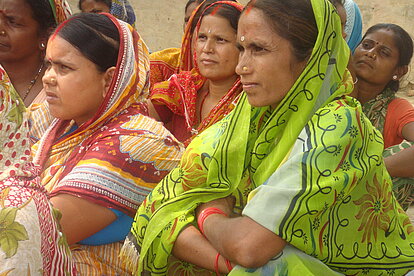No health without mental health
Fighting the shadow epidemic

Whether in Germany or in Africa: mental illnesses such as behavioural disorders, depression and anxiety disorders, but also neurological diseases such as epilepsy or dementia are increasing worldwide. Everywhere, those affected and their relatives are exposed to special burdens: The diseases are still taboo and those affected are stigmatised. At the same time, many countries in the global South have no treatment options because there are hardly any trained specialists, nor medicines or therapies.
While in Germany there are about 15 psychiatrists for 100,000 people, in Malawi there are two registered psychiatrists and two psychologists for 18 million people. In India, there are more, mostly registered psychiatrists, but most mentally ill people cannot afford the expensive private providers. For women, mental disorders are mostly ignored, many are hidden by their families.
Mental and neurological illnesses require long-term medical and specialist treatment. Yet mental health is not considered a priority in many countries in the South. According to estimates by the World Health Organisation (WHO), more than 90 percent of patients in southern Africa do not receive adequate care so far. This is why DIFÄM, together with local partner organisations, is committed to a more open approach to mental illness for the removal of taboos and better access to therapeutic or drug therapy.
Causes of mental illness
The causes of mental illness in poorer countries are manifold. The phrase "poverty makes you ill and illness makes you poor" also applies to mental illness. For example, the absence of a harvest can trigger depression or lead to pathological alcohol consumption. And those who are mentally ill can work less and quickly get caught in a cycle of poverty and illness.
Stress caused by wars, flight, natural disasters or violence against women as well as physical, especially chronic illnesses can also have a negative impact on mental health. For example, many people living with HIV suffer from depressive disorders. Ebola, on the other hand, affected people who were already traumatised by civil wars. Many people who have survived an Ebola infection show typical signs of post-traumatic stress disorder. The dissolution of family structures, the abuse of alcohol and drugs, unhealthy lifestyles and stress at work do not spare the countries of the South.
Especially in rural regions and in low-education settings, demons and punishment by God are cited as causes for mental illness. Accordingly, mentally ill people and often also their relatives are stigmatised and discriminated. They have less opportunities for education and work. Their discrimination can even lead to human rights violations. For a long time, it was also believed that mental illnesses could not be treated or cured. Affected people therefore repeatedly seek help from traditional healers, sometimes with fatal consequences. Even today, it still happens that people with psychoses are hidden away by their families or locked up or chained somewhere outside their village.
This makes it even clearer how urgent it is to improve education and prevention as well as treatment options for mental illness.



